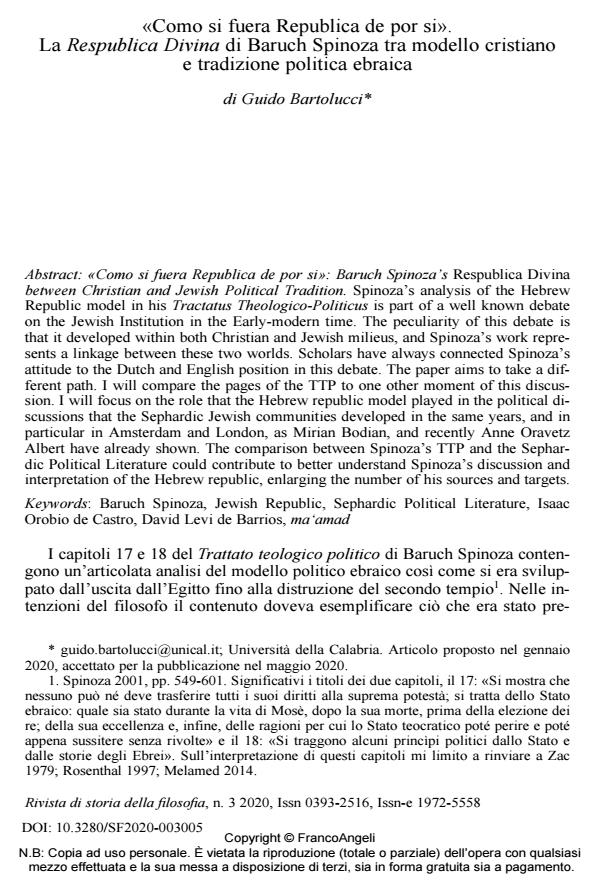«Como si fuera Republica de por si». La Respublica Divina di Baruch Spinoza tra modello cristiano e tradizione politica ebraica
Journal title RIVISTA DI STORIA DELLA FILOSOFIA
Author/s Guido Bartolucci
Publishing Year 2020 Issue 2020/3
Language Italian Pages 24 P. 461-484 File size 129 KB
DOI 10.3280/SF2020-003005
DOI is like a bar code for intellectual property: to have more infomation
click here
Below, you can see the article first page
If you want to buy this article in PDF format, you can do it, following the instructions to buy download credits

FrancoAngeli is member of Publishers International Linking Association, Inc (PILA), a not-for-profit association which run the CrossRef service enabling links to and from online scholarly content.
«Como si fuera Republica de por si»: Baruch Spinoza’s Respublica Divina between Christian and Jewish Political Tradition. Spinoza’s analysis of the Hebrew Republic model in his Tractatus Theologico-Politicus is part of a well known debate on the Jewish Institution in the Early-modern time. The peculiarity of this debate is that it developed within both Christian and Jewish milieus, and Spinoza’s work represents a linkage between these two worlds. Scholars have always connected Spinoza’s attitude to the Dutch and English position in this debate. The paper aims to take a different path. I will compare the pages of the TTP to one other moment of this discussion. I will focus on the role that the Hebrew republic model played in the political discussions that the Sephardic Jewish communities developed in the same years, and in particular in Amsterdam and London, as Mirian Bodian, and recently Anne Oravetz Albert have already shown. The comparison between Spinoza’s TTP and the Sephardic Political Literature could contribute to better understand Spinoza’s discussion and interpretation of the Hebrew republic, enlarging the number of his sources and targets.
Keywords: Baruch Spinoza, Jewish Republic, Sephardic Political Literature, Isaac Orobio de Castro, David Levi de Barrios, ma‘amad
Guido Bartolucci, «Como si fuera Republica de por si». La Respublica Divina di Baruch Spinoza tra modello cristiano e tradizione politica ebraica in "RIVISTA DI STORIA DELLA FILOSOFIA" 3/2020, pp 461-484, DOI: 10.3280/SF2020-003005